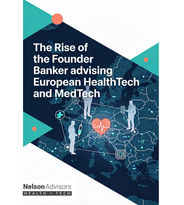Can startups save the NHS?
- Courier Paper
- Dec 3, 2017
- 11 min read

Several tech founders are trying to break into the NHS. How will their smartphone-powered ideas get on in an institution sceptical of change, underpinned by a notorious tangle of IT and bureaucracy?
A near-sacred institution, the NHS has spent little time out of the public psyche since its inception in 1948. Today, far from being a celebrated feat of public welfare, each day brings a barrage of stories of closing hospital A&Es, cuts in funding, huge debts and an ageing population.
Faced by a heavy funding deficit, demands vastly different to when the service was conceived, and shifts in politics and ideology, many believe the NHS is itself strapped to a life support machine.
Yet several enterprising individuals see something quite different in the NHS: a massive client with a £116bn annual budget, and the platform from which to unleash smartphone-powered medical products and services that could spread all over the world. The barriers are high, but if they can be overcome, there’s potential for the NHS to spawn an entire economy in the way that modern-day Silicon Valley sprawled out of Intel, or London’s creative economy was accelerated by the BBC.
In the last couple of years, millions of pounds from VCs and angel investors have been pouring into early stage British ‘medtech’ companies that are already, or have the potential to, sell into the NHS. Around 211 UK-based medical related companies have raised a combined £883m in the last five years, according to research firm Beauhurst.
The NHS is, after all, a platform and client like no other in the world. It is unique in its size, scope and reputation, making it the ideal place to launch a health startup and prove a product’s effectiveness.
Time travelling
If successful, these startups could also achieve something which lavishly paid management consultants and IT firms have failed to do: modernise the NHS, propelling it into the digital age to transform how it operates and provides care, saving billions of pounds along the way.
To the startup world, the state of healthcare provision in 2016, and especially within the NHS, is like time-travelling back to the 1980s; a tangle of paperwork and IT systems that should be consigned to museums combined with an unnecessary level of bureaucracy. It’s an especially striking contrast at a time when enormous leaps have been made in less vital services, from how current accounts are used through to ordering a burger.
But there are already signs of startups at the gates of the NHS. It’s not quite an all-out digital revolution yet, but pilot schemes with smartphones and smartwatches where patients can book appointments, be reminded to take their medication and have their progress tracked by a doctor without visiting a hospital are going on across the NHS. A smaller number of forward-looking trusts have already invested in such startup-created technology. Accelerator programmes and startup initiatives meanwhile are getting rubber stamped by powerful figures within the NHS.
Faster, cheaper, easier
The cheerleaders for the digital transformation of the NHS are quick to illustrate the potential, with utopian descriptions of the future of UK healthcare. A multitude of unsynchronised IT systems and paper files could be replaced with a seamless platform that allows X-rays, medical records, medication, and the vitals of any patient to be available to a doctor at the tap of a tablet screen; no shuffling through papers or post, no lost emails; everything made faster, cheaper, easier and more accurate. Not only would such services make life better for staff and patients, and even save lives, but the cost savings through boosted efficiency could help ensure the NHS’s longevity for many decades.
VC clamour
Early success stories have built confidence. Patients Know Best, a platform that stores digital medical records for care givers, while maintaining patient privacy, has been taken up by 200 sites across the NHS.
Another, Zesty, enables patient and referral bookings to be made through a smartphone. It had focused on private healthcare and dentists, until an NHS sexual health clinic approached founder James Balmain. It’s now used by 30 clinics across London and three large hospitals are set to add the service, ditching call centres and appointments sent by post.
Zesty’s main competitor, Dr Doctor, is used by six trusts, reaching four million patients. Co-founder Tom Whicher says the app is saving each of the trusts over £1m a year by reducing missed and rescheduled appointments, as well as postal costs.
Patients Know Best and Zesty are two of many firms to have benefited from the VC clamour around medtech. Patients Know Best passed through Seedcamp and has since raised £6m, while Zesty has raised over £7m. Another is Network Locum, a platform used to find roaming doctors, which raised £5.3m in summer 2016.
NHS accelerator
The NHS is changing too. After a period of seeming institutional resistance to change and innovation, the NHS is, on the surface, awash with schemes to embrace whizzy new startup ideas.
Funds from various NHS digital schemes have been flowing for the last five years. A snappily named set of ‘Academic Health Science Networks’ were created across the country in 2013, with the sole focus of adopting innovation in the NHS.
So-called ‘vanguard’ hospitals have been given the freedom to spend money on trying out the services startups are coming up with. There’s even an NHS tech accelerator and a new, faster way for hospitals to be reimbursed for spending on new technology (read more: How to get hospitals interested in tech).
Enthusiastic noises
The NHS has appointed a clinical director of innovation, Tony Young, an energetic doctor who’s launched four startups. ‘If there’s a place in the planet where you can innovate at scale in healthcare, the NHS is it. The size means we can do things no one else can do,’ he passionately tells Courier.
Similarly enthusiastic noises are being made by Mahiben Maruthappu, who set up the NHS’s accelerator programme in 2015. He says: ‘Two thirds of the UK population have smartphones, yet only a fraction use them to interact with the NHS. We need to use this as people already have them, so the NHS doesn’t have to pay.’
Advocates like Young and Maruthappu are certainly leading the charge. Pressure to find ways to save money is also a powerful motivation behind adopting new tech. The government reckons tech can greatly contribute to a planned £22bn in savings by 2021, and has earmarked £4bn for making the NHS paperless by 2020.
Hospitals in the red
Melissa Morris worked as a management consultant on healthcare projects before launching Network Locum and sees a new willingness in hospitals to talk to startups. ‘Before, there was more of an option to stay in their comfort zone, but now that all the hospitals are in the red, they’re so indebted, they have no choice. It’s desperate times calling for desperate measures,’ she says.
But this debt, amounting to £2.45bn across the country’s trusts, along with the government’s consistent statements that no more money will be given to the NHS, is as much a barrier as it is an opportunity. It means there’s little extra funding or resources for overworked staff to try things out, let alone fail.
Alluding to the problem, Young says: ‘There’s a real passion and desire [in the NHS]. But a lot of it comes down to the fact that the NHS is given a set amount of money from the elected government, then the leadership has the difficult [task] of deciding how that pot of money is spent.’
Saving money is something startups working with the NHS are acutely aware of. Founders talk of having to provide a saving within a year or risk being dropped from contracts. ‘You have to show the savings you can make right from the start. [When writing a proposal] we clearly show what the savings can be in year one, in year two,’ says Zesty founder Balmain.
Bruce Hellman, founder of patient monitoring app uMotif, adds that he actually helps trusts identify where money can be found to fund the use of the app’s service.
The NHS badge
The power of the NHS stamp around the world is a key attraction for startups. Ivana Schnur, co-founder of Silicon Valley-based AI nursing app Sensly, has placed a large amount of her focus on the NHS, asserting that it’s ‘the best system in the world to prove a product’.
After successful deployments in the NHS, Patients Know Best has launched in 19 other countries. ‘The UK is a lot better than it gets credit for,’ says founder Mohammad Al-Ubaydli. ‘Intros from the NHS go across the world, and if you’ve been marked as a secure platform by the NHS, it makes things a lot easier abroad.’
For AliveCor, a US company that makes hand-held, patient-operated electrocardiograms, selling into the NHS has actually boosted sales back home, triggering meetings with large hospital operators in the US that were previously reluctant to see the product.
‘The big providers had been a tough nut, but since going back to them and saying the NHS loves it and it’s saving money, it’s opened doors,’ says Francis White, who heads up AliveCor’s UK business.
Beyond the obvious places for startups to expand (such as the Gulf, Australia and the US), developing countries – where healthcare is of low quality, but smartphone use high – are also increasingly attractive to these startups. Globally, the digital healthcare market is expected to reach £162bn by 2020.
Loosely structured
There is, however, a big caveat to all the positivity. The barriers to breaking through with a healthcare startup, especially into the NHS, are manifold, and often so onerous many have been scared off.
With no standard road map for selling into hospitals, every startup talks of the stultifying effects of navigating the labyrinthine arteries of the NHS. It’s complicated by the fact that far from being one organisation, the NHS is a decentralised collection of over 200 trusts, akin to individual businesses that decide what services they buy, and from whom.
This loosely structured nature means that just because a business has sold into one trust, it doesn’t follow that any other trust will be interested. With most startups devoid of a massive sales force shuttling the length of the M1, progress is slow going.
‘You have to find a champion in a hospital, a human that appreciates what you’re doing and can see the benefit and go from there,’ comments Rich Khatib, co-founder of Medopad, which produces a series of connected health apps. ‘There are so many hurdles to jump through that, as a small startup team, it’s too difficult to target more than one at a time.’
Culture clash
Bruce Hellman of uMotif adds: ‘The NHS is very difficult to sell into, and it takes longer than it should.’ More recently, Hellman has begun to place greater focus on selling data analysing software to pharma and research companies, noting that the NHS is ‘hard going’.
A recurring issue faced by those who have tried to get a business off the ground in the NHS is a clash of culture between startups and hospital workers, as well as a reluctance to adapt. It’s an issue identified by those from outside the medical profession and so called ‘doctorpreneurs’ alike. ‘Healthcare is built to minimise risk, while entrepreneurs have an inherent risk-taking nature,’ says one doctor.
Maxims from the startup world such as ‘fail fast, fail often’ are anathema in an industry where failure simply isn’t possible. But Tony Young is now keen to instil an attitude of learning from failure in the NHS. To help change attitudes – as well as make the NHS a place where new innovations are developed – he’s signed up 100 doctors to a new entrepreneurial programme.
The problem with a funky app
But changing culture in a disjointed organisation the size of the NHS is never going to be easy. And while the size is appealing to investors, and to startups at the ‘big vision’ stage, it presents extensive challenges with adoption. There are 150,000 doctors, over 300,000 nurses, 150,000 scientists and technical staff, plus 18,000 ambulance workers, 25,000 midwives and 30,000 managers: the NHS is the fifth biggest employer in the world with more staff than India’s railways and almost as many as McDonald’s globally.
Mahiben Maruthappu, who works part-time as an A&E doctor, along with advising the NHS on innovation and running his own health startup, sympathises with the inertia among NHS staff towards new technology. ‘The NHS is under such pressure and people are used to working in a certain way, [so that] with everything else going on, innovation has become a nice-to-have rather than a must-have,’ he says.
‘When I’ve got 40 patients waiting, a funky app is not the first thing I’m going to be thinking about, unless it’s shown that it can make things easier, which is what we must now do.’ It’s a point that further highlights the barrier that a lack of funds and resources presents to innovation.
One NHS employee commented that using new software on old machines that constantly crash leads many to quickly lose faith in technology, as it means things can actually be slowed down in comparison to using good old paper; off-putting when staff in their department are allocated just 12 minutes per patient.
Spend smartly
Lord Darzi is widely credited with starting the process of opening up the NHS to innovation after releasing a report into the future of the service in 2008. Now taking a back seat, having resigned his role as an under secretary in the Department of Health in 2009, he argues that there is enough money in the NHS; but more of the budget needs to be spent on new ways of doing things.
‘The NHS doesn’t need more money, it needs to spend it better,’ he tells Courier. ‘Commissioners need more power to drive innovation. More outdated services can be decommissioned, getting rid of what doesn’t work, rather than the new service needing to be adopted on top of the old as an extra cost.’
Some have found the NHS to be simply an unsuitable client for a startup. After taking the decision to move the headquarters of Big Health (the company that makes mindfulness app Sleepio) to the US in 2015, co-founder Peter Hames told Bloomberg: ‘We assessed [the NHS] and it was just not feasible. We could waste years with no impact.’
Looking overseas
It’s a sentiment shared by former NHS doctor Jamie Wilson. After being unsuccessful in finding a market for a previous digital health startup, he launched home carer hiring platform Home Touch, which explicitly avoids selling to the NHS by going direct to users which receive council grants for care.
‘I know of people for whom it’s taken six or seven years to sell into the NHS,’ he says. ‘I just don’t have that amount of time to persuade people in the NHS to purchase the product.’
Mike Casey, the founder of Futurenova, has decided to focus on exporting his tablet cases, which are designed for hospital use and made in Manchester. He is winning customers in the US and Germany, where thanks to the corporate environment, products can be simply bought online with a business credit card, unlike the complex trail of purchase orders and approvals needed in NHS hospitals.
Despite Sensly’s Ivana Schnur’s enthusiasm for the NHS as a place to prove a product works, she cautions that the commercial case ‘is a little bit more complicated’.
Getting noticed
But despite such challenges, there has undoubtedly been progress, and startups such as Network Locum and Dr Doctor are examples of companies which have won big contracts.
‘It’s become more sophisticated over the last five to 10 years. Before 2003 there was no way of getting your product in front of the top level,’ says NHS veteran Peter Young. He created his first patented medical device 20 years ago, and as a long-term proponent of reform to enable innovation, has had varying success in having his inventions adopted.
There are also now numerous schemes for those inside and outside the NHS to get an idea or product noticed, including MedCity, an organisation created by London’s Academic Health Science Centres and the Mayor of London, that helps startups set up trials within hospitals.
MedCity’s CEO Sarah Haywood argues that, with world-leading NHS hospitals connected to some of the best universities in the world, and London’s already excellent medical research and existing tech scene, the capital is ripe to become the world’s medtech centre.
Indeed, if these startups can successfully marry technical innovation, outstanding product execution and savvy negotiation of the NHS system, as well as get politicians, hospital managers and doctors on side, this wave of innovators could well be at the vanguard of a glut of new products that could transform healthcare around the world.
And it’s not beyond fantasy to believe that, just as the idea of universal healthcare at the point of access was revolutionary when it was introduced in the UK in 1948, innovation in the British health service could well be pioneering and radical once again some 70 years later.
This story is taken from Courier Dec 2016/Jan 2017.


















































Comments